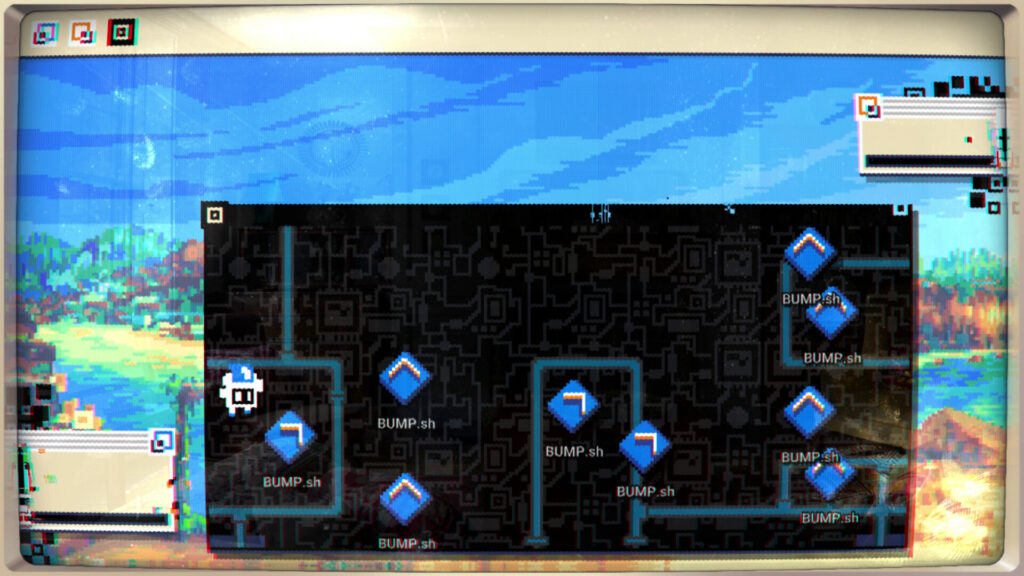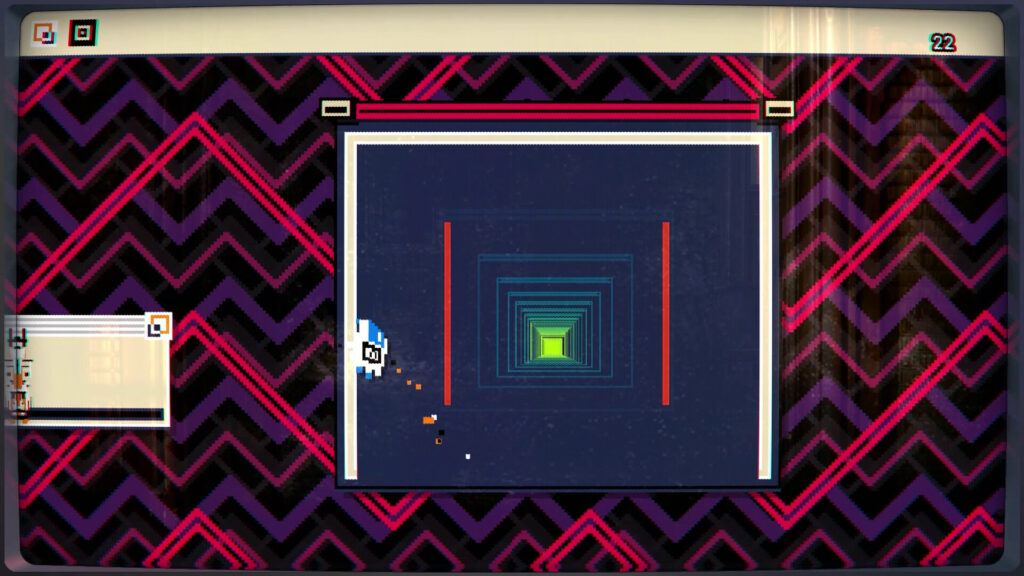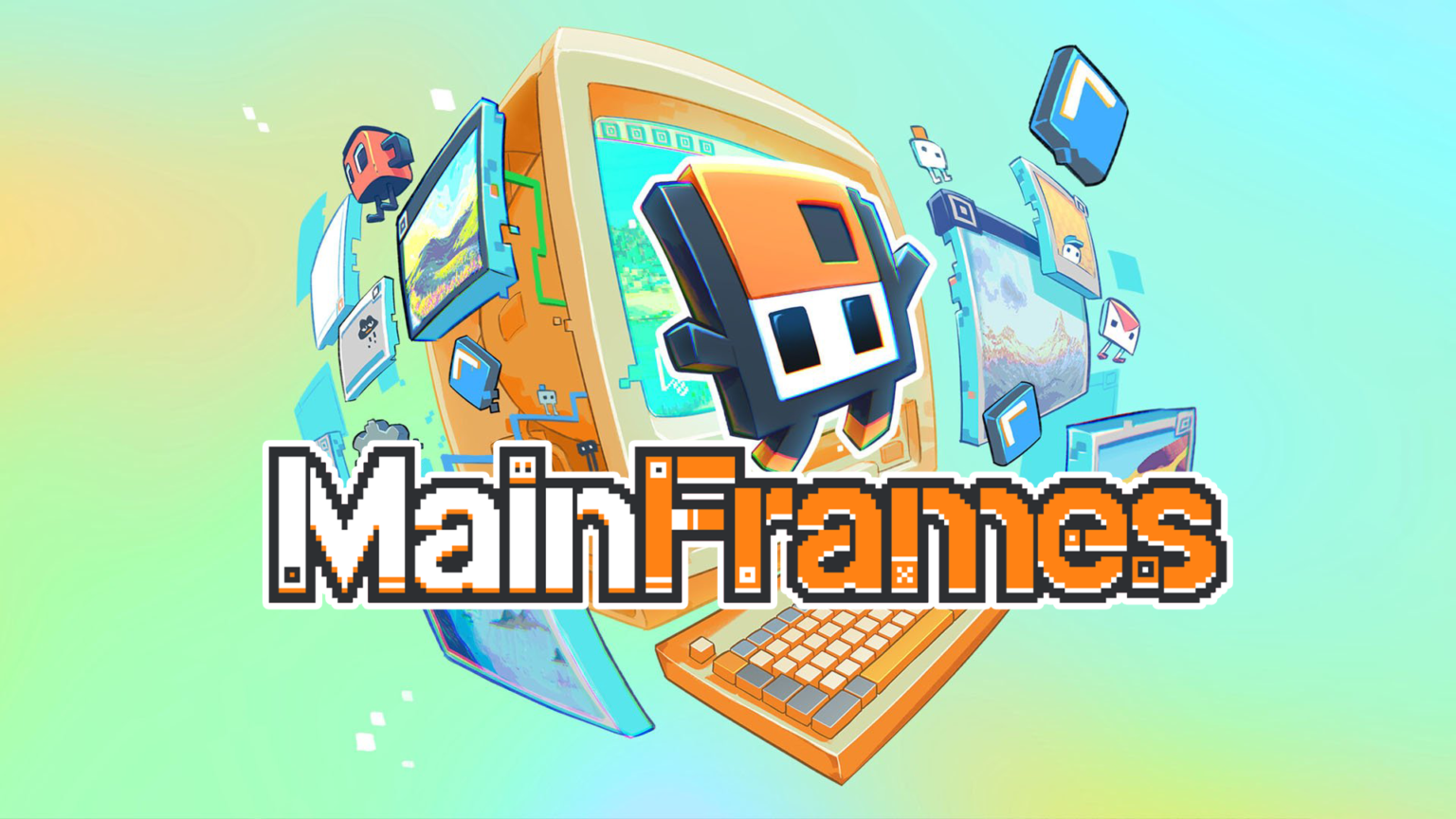Not every indie platformer needs to reinvent the wheel. Some games just take what works, twist it into something new, and run with it—fast, glitchy, and covered in pixel dust. MainFrames is that kind of game. It doesn’t chase trends or drown in nostalgia for its own sake. Instead, it serves up a clever, compact platformer that’s equal parts twitch reflex and puzzle-solving, wrapped in the flickering charm of a corrupted desktop interface.
From the moment you boot it up, MainFrames wears its weirdness like a badge. You’re not a warrior or a wizard. You’re a floppy disk. And your mission? Survive the chaos of a collapsing operating system where everything from menu windows to rogue software glitches can kill you.
🖥️ The Premise: Floppy Disks and Fatal Glitches
You play as a rogue diskette—a literal floppy disk with legs—navigating a labyrinthine digital world on the verge of collapse. Imagine a haunted Windows 95, if it were designed by someone with a deep love for ZX Spectrum aesthetics and a grudge against user interfaces. This is not a metaphorical cyberspace—it’s a literal desktop gone mad.
Each level is built like a screen within an operating system: pop-up windows act as barriers, corrupted toolbars become hazards, and dialogue boxes can crush you. It’s creative, funny, and full of personality, despite never speaking a single word.

🎮 Gameplay: Fast, Precise, and Clever as Hell
At its core, MainFrames is a precision platformer in the tradition of Super Meat Boy, VVVVVV, and Celeste. That means tight level design, instant respawns, and death as a learning tool. But what sets MainFrames apart is how it blends traditional platforming with interface manipulation.
You’re not just jumping through hazards—you’re actively rearranging the level in real-time. A second control input (right stick or mouse) lets you drag and move UI elements while you platform. That window up top? Pull it down mid-jump to create a safe landing. That glitched popup? Use it to block a laser beam. It’s part platformer, part environmental puzzle, and it clicks surprisingly fast.
🧩 Smart Mechanics That Keep You Thinking
What really makes MainFrames sing is how often it reinvents itself within its limited framework. New elements are introduced constantly:
- Window Manipulation: Slide, resize, and reposition UI elements to change the environment on the fly.
- Mirrored Companions: Some levels feature twin characters moving in sync—solve one screen, solve them both.
- Boss-like End Levels: While not traditional bosses, some stages serve as long, intense gauntlets that test everything you’ve learned so far.
- Hidden Routes and Secrets: Exploration is encouraged through branching paths, secret screens, and escort-style missions that reward observation and skill.
Even the difficulty feels fair. Yes, you’ll die. A lot. But instant respawns and minimal punishment keep the flow intact. It’s that one more try energy in pure form.
🎨 Style & Presentation: A Desktop Brought to Life
Visually, MainFrames is distinct. It doesn’t go for modern pixel art gloss. Instead, it leans into early computer aesthetics—CRT flicker, neon outlines, blocky UI, and terminal-style text. Think late-’80s educational software mixed with the cursed charm of a glitched-out OS. It’s weirdly beautiful and completely coherent in its vision.
The soundtrack supports that identity, too. It’s lo-fi, synth-heavy, and reactive without being intrusive. There’s a sense of momentum and atmosphere, even if the game is light on overt storytelling.
Speaking of story…
🧠 Narrative: Hints of Depth, But Nothing Concrete
MainFrames flirts with deeper meaning—a corrupted office system, references to a mysterious “Admin Lisa,” abandoned email threads—but it never truly dives in. That might be fine for players who care more about the gameplay, but those hoping for a Celeste-style emotional arc or Fez-like lore won’t find it here.
There’s worldbuilding through environmental storytelling, but it’s surface-level. The charm lies more in the presentation than in any narrative payoff.

🕹️ Accessibility & Customization
Another big win for MainFrames is its accessibility. Right from the start, the game lets you toggle options like:
- Infinite jumps
- Invincibility
- Slowed-down platforming
These tools make it possible for less experienced players to enjoy the creative mechanics without getting stuck. Hardcore platforming fans can ignore these completely, but they’re a welcome inclusion for inclusivity and experimentation.
🔄 Replayability & Runtime
You’ll likely finish MainFrames in 3–5 hours. It’s not long, but it’s dense with ideas. There’s some replay value if you want to uncover all the secrets, experiment with alternate routes, or speedrun levels. But this isn’t a grind-heavy game—it’s designed to be tight, satisfying, and complete in one go.
And honestly, that’s part of its appeal.
🔧 The Bits That Glitch
For all its charm, MainFrames isn’t perfect.
- Floaty Controls: Movement can feel a bit too light at times. In a game this precise, that extra slipperiness can lead to frustration, especially during mirrored companion sections.
- Occasional Clarity Issues: Some mechanics—like resizing windows or interpreting what a new UI element does—can take trial and error to understand.
- Limited Narrative Depth: There’s a setup, but no real payoff. It’s more of a mood than a story.
- Linear Progression: If you miss a secret or optional route, there’s no way to revisit a single level—you’ll need to restart or move on.
None of these are deal-breakers, but they’re worth noting if you’re expecting something more expansive or emotionally rich.
🧠 Why It Works
MainFrames succeeds because it knows what it is. It’s a focused, imaginative platformer that doesn’t waste your time or patience. It blends genre familiarity with mechanical freshness, delivering a stylish, smart, and satisfying ride through a corrupted digital world.

✅ Code Executed: Where MainFrames Shines
💡 Glitch-Perfect Design
Creative mechanics like UI manipulation and mirrored movement make each screen feel like its own brain teaser.
⚡ Instant Flow
No load screens, no downtime. Die, reset, go again. The rhythm is addictive and satisfying.
🖥️ Retro-Future Charm
Distinct visuals, glitchy vibes, and pixel-perfect UI nods create a unique aesthetic that’s more than just nostalgia.
🎮 Accessible but Hardcore
From invincibility options to brutal gauntlets, the game scales for all players without compromising design integrity.
🧠 Smart, Subtle Puzzles
Even when it gets chaotic, it never feels unfair. You learn by doing—fail forward, get better, repeat.
❌ System Errors: Where It Misses
🌀 Floaty Controls
The jump physics lack the tight feel of top-tier platformers, making some challenges harder than they should be.
🗂️ Light Story, No Payoff
The world hints at satire and emotion but never fully commits. It’s all vibe, little arc.
🔁 Short & Linear
For completionists, there’s meat. But if you’re looking for a long adventure or deep customization, this isn’t it.
🤔 Occasional Confusion
Some mechanics aren’t explained clearly, and figuring them out mid-run can break the flow.
MainFrames: MainFrames is one of those games that knows exactly what it wants to be—and nails it. It’s glitchy in the best way, fast without being overwhelming, and clever without being obnoxious. If you’re a fan of Celeste, VVVVVV, or Super Meat Boy, and you’re open to a few quirks, MainFrames is absolutely worth booting up. It may not change your life, but it’ll challenge your reflexes, make you laugh at a killer pop-up window, and remind you why tight, creative platformers are still one of gaming’s purest pleasures. – Obsidian


